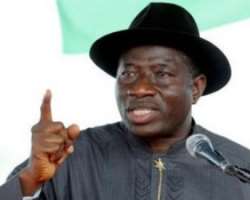Examining Jonathan's Presidential media chat – Punch

The best thing about President Goodluck Jonathan's media chat on Sunday was that it clearly alerted Nigerians not to ever expect a hands-on leadership under his Presidency. Presented one more time with an opportunity to demonstrate statesmanship before distraught Nigerians, Jonathan made a royal hash of it. Rather than use the Presidential Media Chat - broadcast live on radio and television - to reassure a nation reeling from the kidnap of 276 teenage girls, corruption and sundry adversities, the President came across as wimpy at a time the country needed firm and purposeful leadership. A country that is home to the world's largest number of Black people should not appear so rudderless.
Watching Jonathan explain issues was disturbing on several levels. For many Nigerians and the international community, the chat was expected to provide a platform for the President to reassure the parents of the missing girls - captured at Government Secondary School, Chibok, Borno State, by Islamist terrorists three weeks ago - that the security forces were close to rescuing them.
But the media chat left many questions unanswered. His confession that the government did not know the whereabouts of the girls three weeks after their capture by Boko Haram terrorists was shocking. Ineptitude should have its limits and the President should have demonstrated his disappointment with the security forces who, despite a year-long state of emergency in Adamawa, Borno and Yobe states, were so lax that they could not stop a five-hour operation in Chibok, that culminated in the abduction of female pupils as they sat for external examinations.
His parting shot to the parents of the missing girls, whatever his intentions, sounded so disappointing and cruel: 'Let the parents come forward and help us, and I promise we shall find the girls.' Two days after the chat, Boko Haram snatched another set of eight girls in the same state. For a leader who has not visited the grieving parents or the community, who went to a political rally in Kano where he danced and sang a day after the kidnap, and who could not deploy the massive resources of the state to protect them or locate the captives, this was a most insensitive comment. Although he said an intensive search was on and that neighbouring countries, the United States and others had been approached for assistance, the general impression created is that Nigeria is weak and its government incompetent.
Jonathan also reconfirmed a widely-held perception of him as a President who is soft on corruption as revealed by his position on Diezani Alison-Madueke, the Petroleum Resources Minister, who has refused for over a month to appear before a House of Representatives panel probing how she allegedly spent over N10 billion in hiring private jets. Jonathan said, 'But what I want you to know is that the parliament is made up of politicians. And if you have been following the issue, especially in the House, you will know that there is more politics than work.' He went on to accuse the House of 'parliamentary dictatorship,' to rationalise that 'the Ministry of Petroleum has always been using jets,' and wondered why 'some people talk of jet or no jet.'
To many, this outing erases any doubt as to our President's attitude towards corruption and profligacy. By his reckoning, it is 'impossible' to steal billions in Nigeria. 'If anybody steals billion, I am telling you, we will know…' This is laughable. Where was he when billions were siphoned by oil subsidy thieves? The fraud was burst by a House probe panel. The message is clear: the President has foreclosed sincere investigations into the allegations of corruption and it is forlorn to expect that the truth will ever be unearthed or the culprits brought to book under his watch. Even his assurance that the so-called forensic auditing was ongoing offers little comfort.
This is another failure of leadership. Nothing captures this better than our President's twisted understanding of the use of state power. According to him, if he were to exercise 40 per cent to 50 per cent of the powers of an executive president as enshrined in the constitution, Nigerians would call him a dictator. Statesmen use state power for the overall benefit of the people, while dictators abuse it. Nigeria is a failing state today because our rulers do not use power, but abuse it. Politicians who sulkily misuse the power of the state for private or political advantage are a far greater threat to democracy than criminals, even organised gangs.
It is becoming increasingly difficult for any reasonable person to believe that Jonathan has the strong political will to rescue Nigeria from imploding. His glaring lack of understanding of weighty issues is embarrassing. How can 1.6 million unsubstantiated jobs redress the jobless rate among our youths? The US President Barack Obama's stimulus plans have brought unemployment down to 6.7 per cent.
World leaders galvanise, unite and comfort their people during times of crises. The world sees this when Obama grieves with Americans afflicted by adversity. Chile's president led rescue efforts when miners were trapped underground in 2010, and Kenya's Uhuru Kenyatta gave inspired leadership when terrorists bombed a crowded shopping mall in Nairobi last year. South Korea's Park Geun-hye is demonstrating this as the country confronts the trauma posed by a ferry that sank and killed 260 children. Perhaps it would have been better, both for the President's lacklustre image and for Nigerians that Sunday's telecast was never held.
These are the times that try men's souls. The issue, as we noted in earlier editorials, is beyond Jonathan. A far greater threat to Nigeria's democracy lurks within a dysfunctional National Assembly. Nigerians deserve much more from our leaders and Jonathan, especially, needs to retool his Presidency, provide strong, purposeful leadership and avoid repeating the depressing showing he put up on Sunday. Time is running out.
